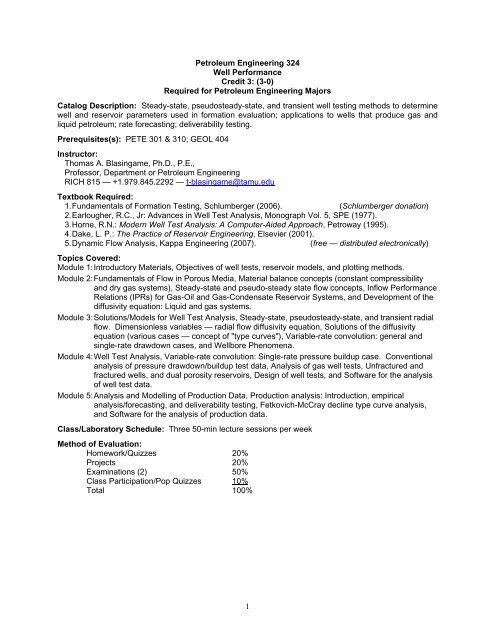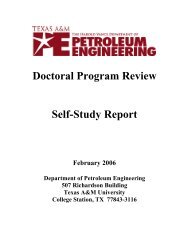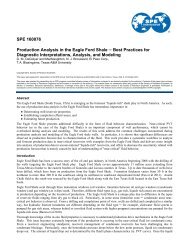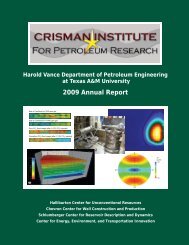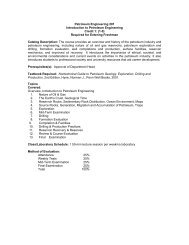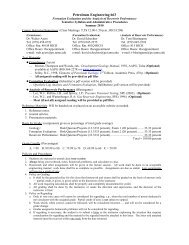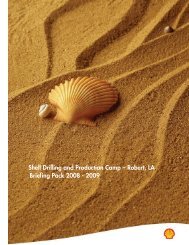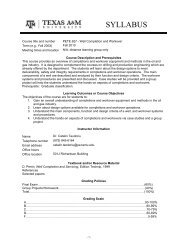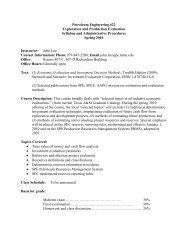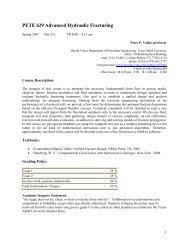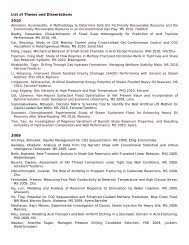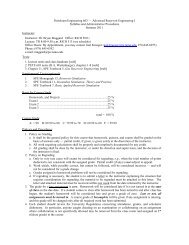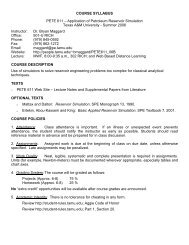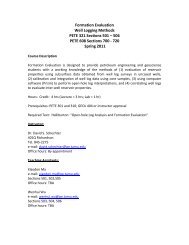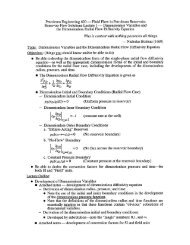Nontechnical Guide to Petroleum Geology, Exploration
Nontechnical Guide to Petroleum Geology, Exploration
Nontechnical Guide to Petroleum Geology, Exploration
Create successful ePaper yourself
Turn your PDF publications into a flip-book with our unique Google optimized e-Paper software.
<strong>Petroleum</strong> Engineering 324<br />
Well Performance<br />
Credit 3: (3-0)<br />
Required for <strong>Petroleum</strong> Engineering Majors<br />
Catalog Description: Steady-state, pseudosteady-state, and transient well testing methods <strong>to</strong> determine<br />
well and reservoir parameters used in formation evaluation; applications <strong>to</strong> wells that produce gas and<br />
liquid petroleum; rate forecasting; deliverability testing.<br />
Prerequisites(s): PETE 301 & 310; GEOL 404<br />
Instruc<strong>to</strong>r:<br />
Thomas A. Blasingame, Ph.D., P.E.,<br />
Professor, Department or <strong>Petroleum</strong> Engineering<br />
RICH 815 — +1.979.845.2292 — t-blasingame@tamu.edu<br />
Textbook Required:<br />
1. Fundamentals of Formation Testing, Schlumberger (2006). (Schlumberger donation)<br />
2. Earlougher, R.C., Jr: Advances in Well Test Analysis, Monograph Vol. 5, SPE (1977).<br />
3. Horne, R.N.: Modern Well Test Analysis: A Computer-Aided Approach, Petroway (1995).<br />
4. Dake, L. P.: The Practice of Reservoir Engineering, Elsevier (2001).<br />
5. Dynamic Flow Analysis, Kappa Engineering (2007). (free — distributed electronically)<br />
Topics Covered:<br />
Module 1: Introduc<strong>to</strong>ry Materials, Objectives of well tests, reservoir models, and plotting methods.<br />
Module 2: Fundamentals of Flow in Porous Media, Material balance concepts (constant compressibility<br />
and dry gas systems), Steady-state and pseudo-steady state flow concepts, Inflow Performance<br />
Relations (IPRs) for Gas-Oil and Gas-Condensate Reservoir Systems, and Development of the<br />
diffusivity equation: Liquid and gas systems.<br />
Module 3: Solutions/Models for Well Test Analysis, Steady-state, pseudosteady-state, and transient radial<br />
flow. Dimensionless variables — radial flow diffusivity equation, Solutions of the diffusivity<br />
equation (various cases — concept of "type curves"), Variable-rate convolution: general and<br />
single-rate drawdown cases, and Wellbore Phenomena.<br />
Module 4: Well Test Analysis, Variable-rate convolution: Single-rate pressure buildup case. Conventional<br />
analysis of pressure drawdown/buildup test data, Analysis of gas well tests, Unfractured and<br />
fractured wells, and dual porosity reservoirs, Design of well tests, and Software for the analysis<br />
of well test data.<br />
Module 5: Analysis and Modelling of Production Data, Production analysis: Introduction, empirical<br />
analysis/forecasting, and deliverability testing, Fetkovich-McCray decline type curve analysis,<br />
and Software for the analysis of production data.<br />
Class/Labora<strong>to</strong>ry Schedule: Three 50-min lecture sessions per week<br />
Method of Evaluation:<br />
Homework/Quizzes 20%<br />
Projects 20%<br />
Examinations (2) 50%<br />
Class Participation/Pop Quizzes 10%<br />
Total 100%<br />
1


